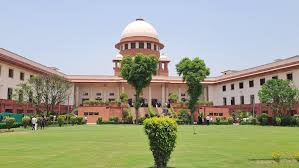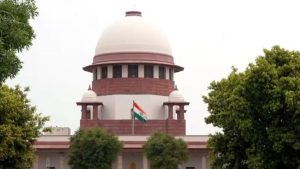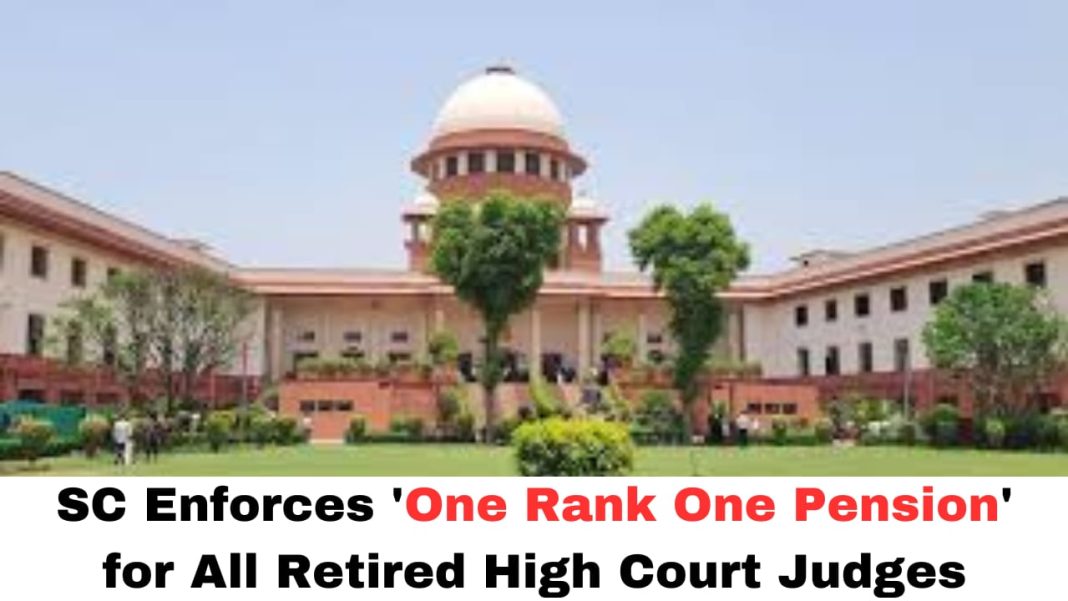Digital News Guru National Desk:
In a landmark judgment on May 19, 2025, the Supreme Court of India mandated the application of the ‘One Rank One Pension’ (OROP) principle to all retired High Court judges. This decision ensures uniform pension benefits for retired judges, eliminating disparities based on their mode of appointment, tenure, or date of retirement.
Background: One Rank One Pension
The concept of ‘One Rank One Pension’ was initially introduced to address pension disparities among military personnel. Over time, the principle has been extended to various sectors to promote equality in post-retirement benefits. The judiciary, being a cornerstone of democracy, has long debated the need for uniform pension structures to uphold the dignity and independence of its retired members.

Landmark Ruling: SC Mandates Equal Pension for All Retired HC Judges
A three-judge bench comprising Chief Justice of India B.R. Gavai, Justice Augustine George Masih, and Justice K. Vinod Chandran delivered the verdict. The Court held that any classification in pension benefits based on whether judges were appointed from the Bar or the district judiciary, or whether they served as permanent or additional judges, is discriminatory and violates Article 14 of the Constitution, which guarantees equality before the law.
Chief Justice Gavai emphasized, “One rank one pension has to be the norm in respect of a constitutional office.” He further stated that once a judge assumes the office of a High Court judge, they enter a constitutional class, and no differential treatment is permissible based on the date of appointment or source of entry.
Key Highlights of the Judgment
- Uniform Pension for All Retired Judges: The Court ruled that all retired High Court judges are entitled to full and equal pension, regardless of whether they were appointed from the Bar or the district judiciary, and irrespective of their tenure or date of retirement.
- Inclusion of Additional Judges: Judges who retired as Additional Judges are to be treated on par with Permanent Judges concerning pension entitlements.
- Specific Pension Amounts:
- Retired Chief Justices of High Courts will receive an annual pension of Rs 15 lakh.
- Other retired High Court judges will receive Rs 13.5 lakh per annum.

- No Discrimination Based on Entry Source: The Court emphasized that any classification in pension benefits based on the source of entry—whether from the Bar or district judiciary—is discriminatory and violates Article 14 of the Constitution, which guarantees equality before the law.
- Applicability to Judges Under New Pension Scheme (NPS): Judges who entered service under the NPS are also entitled to full pension benefits. The Court directed that contributions made by such judges to the NPS, along with any accrued dividends, should be refunded.
- Family Pension Benefits: The ruling extends equal family pension benefits to the widows, widowers, and dependents of all judges, including those who retired as Additional Judges.
Implications
This judgment addresses long-standing disparities in the pension system for retired High Court judges, reinforcing the principle of equality and the dignity of judicial office. Legal experts have hailed the decision as a progressive step towards strengthening the independence of the judiciary by ensuring financial security and eliminating discriminatory practices in pension disbursement.
Conclusion
The Supreme Court’s directive to implement the ‘One Rank One Pension’ principle for all retired High Court judges marks a significant step towards ensuring equality and fairness in the judiciary’s post-retirement benefits. By eliminating disparities based on appointment mode or tenure, the Court reinforces the constitutional values of equality and non-discrimination, upholding the dignity of the judicial office.
- Uniform Pension Amounts: Retired Chief Justices of High Courts will receive an annual pension of Rs 15 lakh, while other retired High Court judges will receive Rs 13.5 lakh per annum.
- Inclusion of Additional Judges: Judges who retired as Additional Judges are to be treated on par with Permanent Judges concerning pension entitlements.

- No Discrimination Based on Entry Source: The Court emphasized that any classification in pension benefits based on the source of entry—whether from the Bar or district judiciary—is discriminatory and violates Article 14 of the Constitution.
- Applicability to Judges Under New Pension Scheme (NPS): Judges who entered service under the NPS are also entitled to full pension benefits. The Court directed that contributions made by such judges to the NPS, along with any accrued dividends, should be refunded.
- Family Pension Benefits: The ruling extends equal family pension benefits to the widows, widowers, and dependents of all judges, including those who retired as Additional Judges.
You May Also Read: Shibani Bedi Mourns the Loss of Her Father: A Heartfelt Tribute to Arvind Bedi








